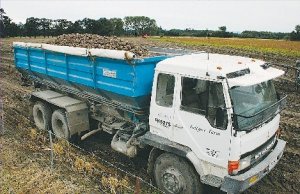The venue was 2011 winners Raymond and Adrianne Bowan's Fallgate Farm, South Canterbury, the starting point for the Heartland Potato Chip business they've developed over the past three years.
It's the latest in a long line of opportunities seized by the Bowans who, since buying the 340ha home farm in 1975, have added eight neighbouring properties to grow it to 1150ha, with a further 219ha about 30km away.
"I always wanted to be a farmer; not a dairy farmer like Dad, but a cropping farmer," Bowan said at the days' start.
"Picking potatoes was back breaking work, but it was what I loved doing."
In those early days Farm Rd, Orari, was "so quiet I could leave a fertiliser truck on it while I drilled a paddock".
Today, scores of trucks thunder past every day, and night, on their way to Fonterra's Clandeboye factory.
But don't expect to see Fallgate Farm go dairy anytime soon. Bowan's passion for potatoes is clearly as strong as ever, and the family's extension of the business down the value chain is what landed them the innovation themed 2011 Lincoln award.
"It came about because Bluebird decided to close their chip factory in Timaru in November 2009 with little notice... that had a real impact on me as a supplier. About a third of the potatoes I grew were for this factory."
Giving up potatoes and simplifying was one option considered, but "that did not sit well" after 40 years in the crop; pursuing a long held dream of "taking them from the paddock to the packet" did.
First step was to talk to the family, who were supportive, though under no illusion about how hard it would be. Then "two key people" were quizzed: the former factory manager and a sales person "with many years' experience in the crisp industry".
Both believed the paddock to packet concept was viable, which gave Bowan the confidence to approach the bank and the local development trust to progress the plan.
An off-farm cool store was sold and the now gutted factory, was bought.
"It wasn't in a good state. It needed a new floor and internal walls. Also we needed to source new plant."
The search for that took him to Australia and Holland, and it was trucked down from Lyttelton the day before the September 4 earthquake, 2010.
Meanwhile the Heartland brand and packaging was developed, and supermarkets approached.
"It was certainly a learning curve but we never had any negative feedback."
Sales manager Brian Kirby – one of the two "key people" Bowan had consulted on the feasibility of the plan, and later recruited – says gluten-free, no trans-fat, and "straight from the farm" have proved powerful selling points.
"We under estimated the 'straight from the farm' element. It's been a huge marketing tool."
Three months after launch Heartland Potato Chips were "ranged" – ie stocked in a retailer's central distribution depot – by New World.
"That's virtually unheard of," says Kirby. It saves Heartland making deliveries to individual stores.
Today, after just 16 months on the market, they're in all New World and Pak'nSave stores in the South Island, and moving North.
"We have a 17% market share in the South Island and are the number two brand."
However, 50% of the New Zealand market is north of Taupo, so there's plenty of room for growth, as there is at the factory. Exports are also being considered.
Bowan credits wife Adrianne for coming up with the Heartland brand which, as Kirby puts it, "is about the farm and where they come from. It's just a great name for a potato chip grown on this farm and processed 20km away."
But the product, which is fried in a custom-made, sunflower and canola-based oil blend, also has to live up to the branding. The aim is to have the freshest crisps on the shelf by minimising stock held and almost cooking to order.
"We have a state of the art plant and a [factory] manager who is hugely passionate... When the potatoes are not as good as they are now we end up throwing out a lot more. The product has to be virtually perfect to go in the bag."

















